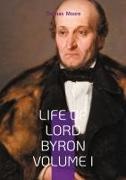Read more
Thomas Moores Life of Lord Byron VolumeI immerses readers in the turbulent early years of the 19th centurys most infamous poet, blending intimate correspondence with incisive biographical analysis. This definitive account traces Byrons meteoric ascent from a troubled aristocratic childhood to the publication of Childe Harolds Pilgrimage, which catapulted him to celebrity status across Europe.
Moore illuminates Byrons fraught relationships with figures like Lady Caroline Lamb and his half-sister Augusta Leigh, framing them against his poetic innovations that birthed the Byronic hero archetype. The narrative dissects the paradoxes of a man whose work championed liberty while his personal excesses debt, scandalous affairs, and self-imposed exile cemented his reputation as a rebellious icon. Key themes include the interplay between artistic genius and self-destruction, the commodification of literary fame, and the sociopolitical tensions of post-Napoleonic Europe that shaped Byrons worldview.
Rich in primary sources, including previously unpublished letters, this volume serves as both a psychological portrait and a cultural study of Romanticisms defining figure. It will resonate with readers of literary biographies and those exploring the roots of modern celebrity culture.
About the author
Thomas Moore (1779;1852), Irelands national bard and Byrons confidant, bridged political activism and lyrical artistry in works like Life of Lord Byron. Born in Dublin to a Catholic merchant family, his education at Trinity College during the 1798 Rebellion imbued his writing with anti-colonial fervor, later channeled into Irish Melodies songs that became anthems for Irish cultural nationalism.
A pivotal figure in Londons literary circles, Moores friendship with Byron began in 1811, culminating in his role as the poets chosen biographer. His meticulous preservation of Byrons correspondence, despite pressure to censor its contents, established new standards for biographical integrity. Beyond this magnum opus, Moores Lalla Rookh (1817) solidified his reputation as a master of orientalist romance, while his satirical The Fudge Family in Paris critiqued post-Waterloo politics.
Though often overshadowed by his subjects fame, Moores legacy endures through his dual role as chronicler of Byrons genius and architect of Irelands literary renaissance.

